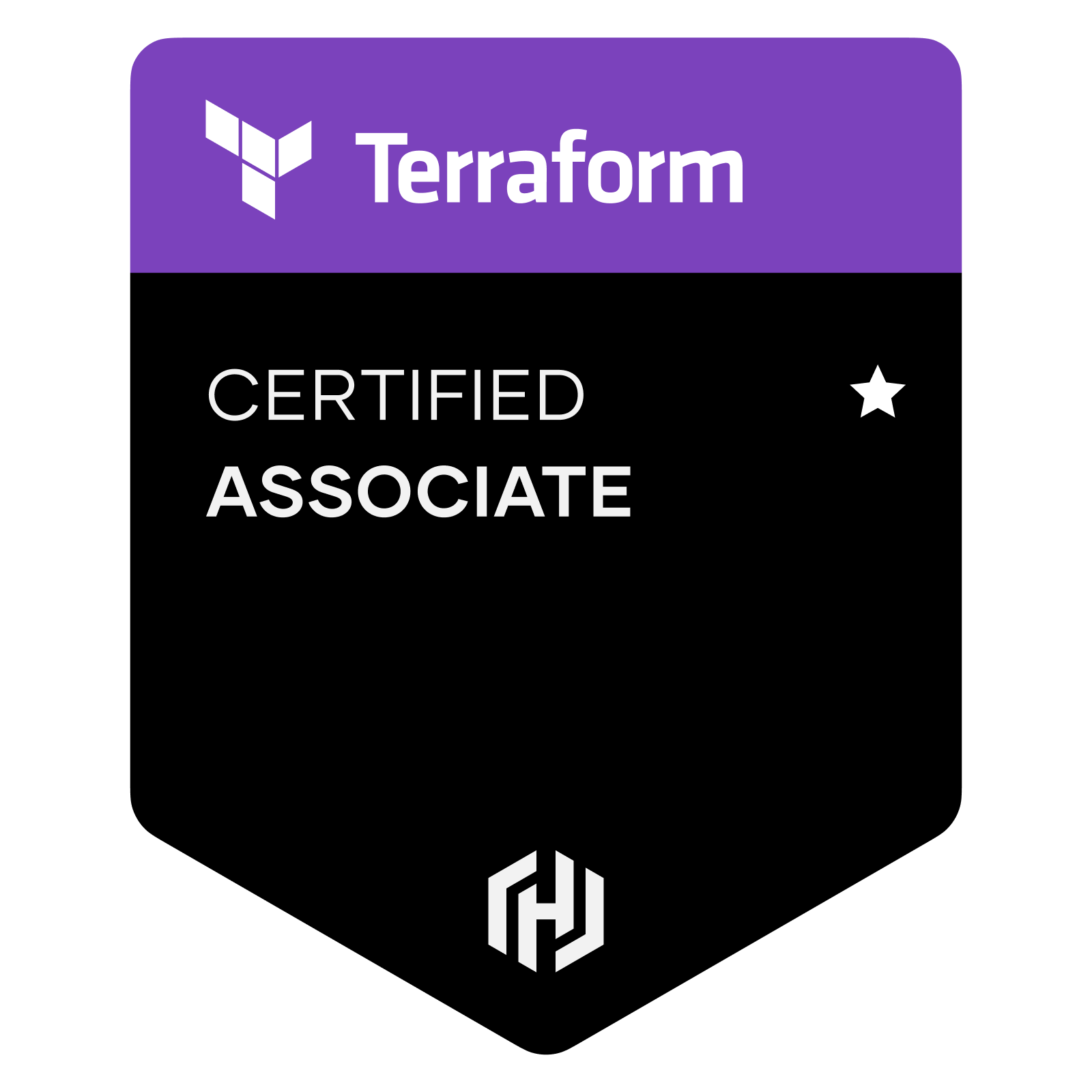Prerequisites
- Basic terminal skills
- Basic understanding of on premises and cloud architecture
Product version tested
We are updating the Terraform product version covered in this exam!
- Now through April 30th: Terraform product version 1.0+
- May 1st and beyond: Terraform product version 1.4
This update does not affect the exam version or your badge's validity.
Preparing for the exam
The Terraform Associate 003 exam has both a study guide and a review guide. While much of the information in these two guides are the same, they are presented differently for different uses. Use the study guide if you want to study all the exam objectives. Use the review guide if you already have Terraform experience and/or training and want to pick and choose which objectives to review before taking the exam. There are also sample questions available so you can get a feel for what the exam will be like.
Renewing your Terraform Associate certification
To renew any Terraform Associate certification, you will need to take and pass the new Terraform Associate 003 exam.
If you hold an unexpired Terraform Associate 002 certification:
You can take the new (003) exam starting 18 months after your previous exam date. When you pass the Terraform Associate 003 exam to recertify, you will receive a new, separate set of credentials (badge and corresponding certificate) that will reflect your recertification date. The date of your credentials related to your Terraform Associate 002 certification will not be updated.
If you hold an unexpired Terraform Associate 003 certification:
You can take the new exam starting 18 months after your previous exam date. When you pass the new exam, the expiration date on your credentials will be extended.
If you hold an expired Terraform Associate certification:
You are eligible to recertify at any time. When you pass the new exam, you will receive a new, separate set of credentials with a new expiration date.
Exam details
| Assessment Type |
Multiple choice |
| Format |
Online proctored |
| Duration |
1 hour |
| Price |
$70.50 USD plus locally applicable taxes and fees Free retake not included
|
| Language |
English |
| Expiration |
2 years |
Exam objectives
| 1 |
Understand infrastructure as code (IaC) concepts |
| 1a |
Explain what IaC is |
| 1b |
Describe advantages of IaC patterns |
| 2 |
Understand the purpose of Terraform (vs other IaC) |
| 2a |
Explain multi-cloud and provider-agnostic benefits |
| 2b |
Explain the benefits of state |
| 3 |
Understand Terraform basics |
| 3a |
Install and version Terraform providers |
| 3b |
Describe plugin-based architecture |
| 3c |
Write Terraform configuration using multiple providers |
| 3d |
Describe how Terraform finds and fetches providers |
| 4 |
Use Terraform outside of core workflow |
| 4a |
Describe when to use terraform import to import existing infrastructure into your Terraform state |
| 4b |
Use terraform state to view Terraform state |
| 4c |
Describe when to enable verbose logging and what the outcome/value is |
| 5 |
Interact with Terraform modules |
| 5a |
Contrast and use different module source options including the public Terraform Module Registry |
| 5b |
Interact with module inputs and outputs |
| 5c |
Describe variable scope within modules/child modules |
| 5d |
Set module version |
| 6 |
Use the core Terraform workflow |
| 6a |
Describe Terraform workflow ( Write -> Plan -> Create ) |
| 6b |
Initialize a Terraform working directory (terraform init) |
| 6c |
Validate a Terraform configuration (terraform validate) |
| 6d |
Generate and review an execution plan for Terraform (terraform plan) |
| 6e |
Execute changes to infrastructure with Terraform (terraform apply) |
| 6f |
Destroy Terraform managed infrastructure (terraform destroy) |
| 6g |
Apply formatting and style adjustments to a configuration (terraform fmt) |
| 7 |
Implement and maintain state |
| 7a |
Describe default local backend |
| 7b |
Describe state locking |
| 7c |
Handle backend and cloud integration authentication methods |
| 7d |
Differentiate remote state back end options |
| 7e |
Manage resource drift and Terraform state |
| 7f |
Describe backend block and cloud integration in configuration |
| 7g |
Understand secret management in state files |
| 8 |
Read, generate, and modify configuration |
| 8a |
Demonstrate use of variables and outputs |
| 8b |
Describe secure secret injection best practice |
| 8c |
Understand the use of collection and structural types |
| 8d |
Create and differentiate resource and data configuration |
| 8e |
Use resource addressing and resource parameters to connect resources together |
| 8f |
Use HCL and Terraform functions to write configuration |
| 8g |
Describe built-in dependency management (order of execution based) |
| 9 |
Understand Terraform Cloud capabilities |
| 9a |
Explain how Terraform Cloud helps to manage infrastructure |
| 9b |
Describe how Terraform Cloud enables collaboration and governance |
